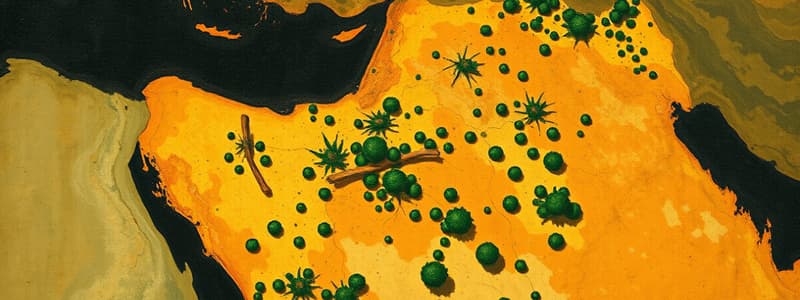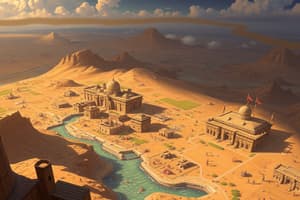Podcast
Questions and Answers
What is the Fertile Crescent?
What is the Fertile Crescent?
A region known for its rich land
Name an important trade center of the Sumerians.
Name an important trade center of the Sumerians.
Ur
What was Uruk considered?
What was Uruk considered?
The first true city in the world
What type of religion did the Sumerians practice?
What type of religion did the Sumerians practice?
What did the Sumerians build to make the gods happy?
What did the Sumerians build to make the gods happy?
Who controlled the earliest Sumerian governments?
Who controlled the earliest Sumerian governments?
What items did the Sumerians barter?
What items did the Sumerians barter?
What solution did the Sumerians develop for irrigation?
What solution did the Sumerians develop for irrigation?
What writing system did the Sumerians create?
What writing system did the Sumerians create?
What invention helped to transport goods more easily?
What invention helped to transport goods more easily?
What base did the Sumerians use for their number system?
What base did the Sumerians use for their number system?
What celestial events did the Sumerians regularly observe?
What celestial events did the Sumerians regularly observe?
Flashcards are hidden until you start studying
Study Notes
Geography and Environmental Challenges
- Dominated by a desert climate, the region is known as the Fertile Crescent due to its curved shape and rich land.
- Environmental issues include unpredictable flooding and limited natural resources, compounded by periods of drought.
- The lack of natural barriers left the region exposed and vulnerable.
Sumerian City-States
- City-states are defined as political and economic entities controlling surrounding areas.
- Ur was a key trade center located at the junction of the Tigris and Euphrates rivers flowing into the Persian Gulf.
- Uruk is recognized as the first true city in the world, showcasing early urban development.
Religion
- Sumerians practiced polytheism, worshipping anthropomorphic gods who influenced various aspects of life, from health to natural disasters.
- Unique gods existed for specific professions (e.g., fishermen, farmers).
- Ziggurats, stepped pyramids made from sun-baked bricks, were built as shrines for the gods, complete with sacrifices.
Governance and Society
- Early governance was centered around temple priests, who acted as intermediaries between the gods and the populace.
- Temples were hubs of economic and political activity, with rulers believed to be chosen and protected by the gods.
Sumerian Economy
- Economic activities included bartering wool, barley, dried fish, wheat, and metal goods.
- They imported essential materials, notably copper, tin, and timber, to support their economy.
Solutions to Environmental Challenges
- To manage water shortages, Sumerians constructed irrigation canals to divert river water to fields.
- Defensive measures like city walls were built using mud bricks, enhancing protection against invasions.
- Flood management involved dikes and dams to control river overflow and protect agricultural areas.
Innovations and Technologies
- Developed cuneiform writing, using a reed stylus to create wedge-shaped symbols on clay tablets.
- Invention of the wheel facilitated the transportation of goods via wheeled carts; also utilized a potter's wheel for ceramics.
- Advanced mathematics included multiplication and division tables, leading to a base-60 number system influential in timekeeping and geometry.
Astronomy and Calendar Systems
- Sumerians meticulously observed celestial bodies, tracking the positions of planets and lunar phases.
- Established a lunar calendar based on the moon's cycles, contributing to foundational astronomical knowledge.
Studying That Suits You
Use AI to generate personalized quizzes and flashcards to suit your learning preferences.




